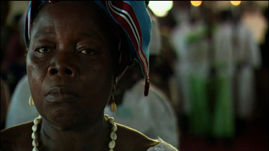Teachers' Domain - Digital Media for the Classroom and Professional Development
User: Preview


LEYMAH: Liberia had been at war for so long that my children had been hungry and afraid their entire lives. Some say the war was about the gap between the rich and the poor. Some also say that the war was about the hatred between the different ethnic groups. Others say the war was to control natural resources. Power, money, ethnicity, greed. But there is nothing, in my mind, that should make people do what they did to the children of Liberia.
LEYMAH: The war started on Christmas Eve in 1989. That was when Taylor started his bloody rise to power.
SUGARS: He had absolute power and total control over the finances of the country.
VAIBA: Life was bad, it was miserable. People, they couldn’t even afford a cup of rice.
LEYMAH: Taylor had his private army, which was called the Anti-Terrorist Unit. We lived in fear.
LEYMAH: It was always like, you go to bed and pray that you have something different the next day. You know, that the shooting will stop, that the killing will stop, that the hunger will stop, saying, "God, please."
LEYMAH: I had a dream. And it was like a crazy dream, that someone was actually telling me to get the women of the church together to pray for peace.
LEYMAH at WIPNET: This is completely a terrible life to live. We are tired. We are tired!
LEYMAH: But then as I said the dream it was like more ideas kept coming.
LEYMAH at WIPNET: We feel it’s now time to rise up and speak. But we don’t want to do this alone. We want to invite the other Christian churches to come and let’s put our voices together.
LEYMAH: And we started the Christian Women’s Peace Initiative.
LEYMAH at WIPNET: You are asking, "Who are these women?" I will say they are ordinary mothers, grandmothers, aunts, sisters. For us, this is just the beginning.
ASATU: I was moved. Then I raised my hand, and then I was recognized. And then I walk out before the church, and then I said, "Praise the Lord," and then everybody said, "Amen." So then I said, "I have a surprise for this congregation.” And I said, "I am the only Muslim in this church."
ASATU: I was moved, and I’m impressed by the Christian Women’s Initiative.
ASATU: And everybody was just there, "Oh, Hallelujah!" They praised the Lord. They were so happy that I was there.
ASATU: God is up. We’re all serving the same God. This is not only for the Christian women. I want to promise you all today that I’m going to move it forward with the Muslim women.
ASATU: I knew my Muslim sisters. And then I knew who to contact. I wanted it to be an initiative that was going to continue. When I sold the idea to them, they were more than excited. And then they said, "Let’s go for it."
VAIBA: At first it was, it was somehow difficult. When we started, some Christians said being a follower of Christ and going to work along with the Muslim means they were diluting their faith. But the message that we took on was can the bullet pick and choose? Does the bullet know Christian from Muslim?
LEYMAH: Taylor went to church. And the leadership of LURD went to the mosque. Taylor could pray the devil out of hell. And we said If this man is so religious, we need to get to that thing that he holds firmly to. So if the women started pressurizing the pastors and the bishops, the pastors and the bishops would pressurize the leaders. And if the women from the mosque started talking to their imams, they would pressurize the warlords also.
WOMAN AT MOSQUE: We encourage the fighter to come home, to lay the gun and come, to make peace.
 Loading Standards
Loading Standards